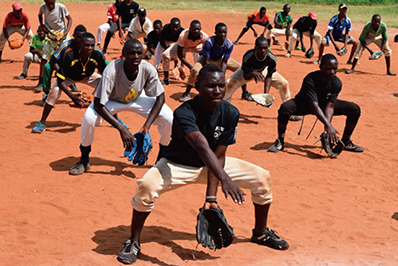(5) Culture and Sports
In developing countries, there is a growing interest in the preservation and promotion of their own cultures. Cultural heritage that symbolizes a country is a source of pride for people, and, as tourism resources, can be effectively utilized to develop the socio-economic environment of the residents in the surrounding areas. On the other hand, there are also a number of cultural heritage sites that are exposed to an existential crisis due to the lack of funds, equipment, technology, etc. Assistance to protect such cultural heritage is a form of cooperation that directly reaches the hearts of the people in those countries and has long-term effects. In addition, the preservation and promotion of culture, such as invaluable cultural heritages that are shared by all humankind, is an issue that should be addressed not only by the countries with cultural heritage in danger, but also by the entire international community.
In addition, interest in the promotion of sports is also growing in developing countries. Sports can enhance the quality of people’s lives, as they cultivate a sense of respect for opponents, a spirit of mutual understanding and awareness of norms, as well as help maintain and improve health. The influence and positive power of sports play the role of “catalyzer” for the development and growth of developing countries.
■Japan’s Efforts

The Giants Academy (Note 14) being held in Tanzania. Japan has hosted the “Tanzania Koshien Baseball Championship” six times in the country, contributing to the popularization of baseball in the country. (Photo: JICA)
Japan has contributed to the promotion of culture and higher education, as well as preservation of cultural heritage in developing countries through the Cultural Grant Assistance* since 1975. Specifically, Japan has constructed facilities necessary for preserving and utilizing cultural heritage and cultural properties, sports and cultural facilities, and facilities of higher education and research institutions in developing countries. Japan has also provided necessary equipment for these facilities. Such facilities built in developing countries also serve as centers for providing information on Japan and for cultural exchanges with Japan, as well as for deepening understanding of Japan and fostering a sense of affinity towards Japan.
In FY2017, Japan approved 23 projects to provide support in the fields of education, broadcasting and publishing, and sports under the Cultural Grant Assistance. In 2018, Japan continued its proactive efforts to provide sports assistance using ODA and “Projects for Sports Diplomacy Enhancement” to advance “Sport for Tomorrow,” a program launched for the purpose of international contribution through sports, with which Japan shares the value of sports and spreads the Olympic and Paralympic movement as the host country of the Olympic and Paralympic Games Tokyo 2020. In particular, Japan decided upon providing sports facilities and equipment to four countries through the Cultural Grant Assistance and has dispatched 278 JICA volunteers in the field of sports.
Moreover, Japan provides support for the restoration and preservation of cultural heritage, including equipment provision and preliminary studies and surveys, through the “Japanese Funds-in-Trust for Preservation of the World Cultural Heritage” established in the United Nations Educational, Scientific and Cultural Organization (UNESCO). Placing a particular emphasis on human resources development in developing countries, based on the idea of enabling people in these countries to protect the cultural heritage of their own country by themselves in the future, Japan also endeavors to dispatch international experts, mainly Japanese experts, as well as hold workshops in order to transfer the technology and expertise to developing countries. In addition to tangible cultural heritage, Japan also supports safeguarding of intangible cultural heritage such as traditional dances, music, handcraft techniques, and oral lore (oral traditions) by implementing successor training, records conservation, creation of safeguarding mechanisms, and other activities through the above-mentioned Funds-in-Trust.
Furthermore, the Ministry of Education, Culture, Sports, Science and Technology (MEXT) implements the Cooperation Promotion Program for the Protection of World Heritage and Other Cultural Properties in the Asia-Pacific Region, through which it invites young experts on cultural heritage protection from the Asia-Pacific region to Japan for training.
- *Cultural Grant Assistance
- Cultural Grant Assistance provides funding to procure equipment and supplies, and improve facilities for the promotion of culture and higher education in developing countries. It is intended to encourage cultural and educational advancements in these countries as well as cultural exchanges between Japan and the countries, with a view to deepening friendships and mutual understanding. This cooperation includes General Cultural Grant Assistance, which provides assistance to governmental organizations, and Grant Assistance for Cultural Grassroots Projects, which provides assistance to NGOs and local public entities for small-scale projects.
- Note 14:The Giants Academy is a dispatch program for baseball instructors based on a business partnership agreement between JICA and the Yomiuri Giants (one of the Japanese professional baseball teams) in which baseball guidance is provided by the Giants Academy coaches.
